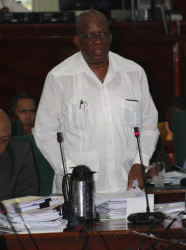The government on Thursday passed an amendment to secure the financial autonomy of several constitutional bodies, including the service commissions, by allowing them to receive lump sum allocations in the budgeting process.
The Fiscal Management and Accountability (Amendment) Bill 2015 was passed after being piloted by Minister of Finance Winston Jordan, who emphasised that the financial autonomy given to the agencies would not exclude them from having to meet accounting and auditing standards.
“The removal of all vestiges of interference by the Executive into the affairs of the constitutional agencies will boost the public’s confidence in the operations and decisions of these bodies,” Jordan told his colleagues in the House.

As has happened since the 11th Parliament was convened, the bill was passed in the absence of the opposition PPP/C, whose members are yet to take up their seats in the National Assembly.
According to its explanatory memorandum, the bill seeks to amend the Fiscal Management and Accountability Act to establish the financial independence of the constitutional entities to specifically allow for lump sum payments to be made to them and to free them from the automatic obligations of budgetary agencies and the attendant discretionary powers exercised by the Minister of Finance. The bill also extends the application of the Act to the responsible minister, who would be liable on conviction to a $2 million fine and to imprisonment for three years for offences under the law.
The entities that fall under the new bill are the Chambers of the Director of Public Prosecutions, the Judicial Service Commission, the Public Service Commission, the Police Service Commission, the Teaching Service Commission, the Public Service Appellate Tribunal, the Public Procurement Commission, the Office of the Ombudsman and the Guyana Elections Commission (Gecom).
The bill complements the recently passed Constitution (Amendment) Bill that amended the Third Schedule of the Constitution to include the entities.
Both bills were previously passed by APNU and AFC while they were in opposition but they failed to persuade the former Donald Ramotar administration to give assent to enact the legislation. Former Attorney-General Anil Nandlall had previously advised against assent, saying there must be a two-thirds majority to amend the Constitution or there could be a constitutional crisis in the making.
Speaking to the bill on Thursday, Minister Jordan said that its passage will not trample on or fiddle with well-known and tested budget principles and practices.
“Lump sum budgeting is a legitimate means of budgeting that is practiced in several jurisdictions when dealing especially with constitutional agencies,” he said.
According to Jordan, while the legislation would enhance the independence of the constitutional agencies by giving them complete control of their finances, there are built-in mechanisms and procedures to safeguard against abuse of the newfound freedom and which impose a duty to manage their subventions “in conformity with the financial practices and procedures approved by the National Assembly.”
“Thus, the constitutional agencies will be held to the same budget preparation, accounting and auditing standards as the rest of the government sector,” he added.
Jordan said the agencies will be prevented from opening commercial bank accounts and depositing the lump sum into interest bearing accounts.
They will also be required to return any unspent balance to the Treasury at the end of the year and will be required to keep the same records, the same books, and use the same charts of account format but the executive will be prevented from telling them what to budget in each line item.
He revealed that in 2014 the current and capital estimates of the respective agencies amounted to $5.73 billion or 2.9% of the total appropriation budget and out of that figure $3.3 billion was for Gecom to prepare for elections.
The minister noted that in periods when there are no elections, the estimates of expenditure of the agencies could be considerably less. Therefore, Jordan said, the requirements of the combined constitutional agencies are relatively small and can be managed without financial stress.
Even if there is some pressure exerted on the revenue and expenditure of the government by the lump sum disbursement early in the year, he added, it would be a small price to pay for the financial independence envisaged by the Constitution.
Once the bill is enacted, Section 85 of the Act would be amended to make the minister liable on conviction to a fine of $2 million and to imprisonment for three years if he/she falsifies any account, statement, receipt or other record issued or kept for the purposes of the Act, the Regulations, the Finance Circulars or any other instrument made under the Act; conspires or colludes with any other person to defraud the State or make opportunity for any person to defraud the State; or knowingly permits any other person to contravene any provision of the Act.





